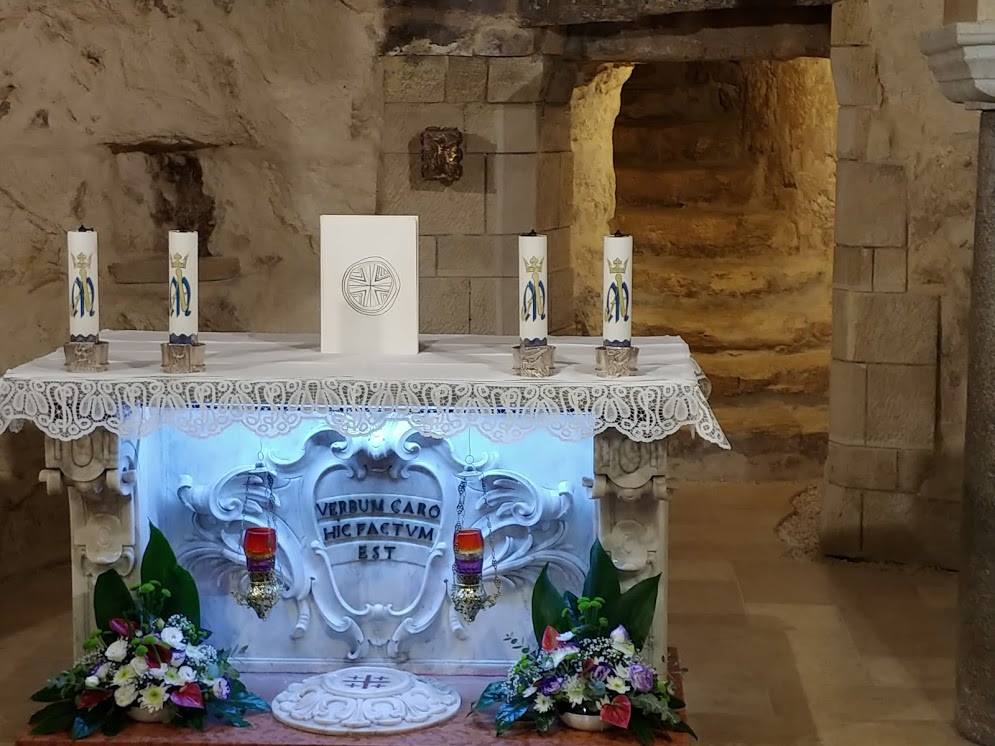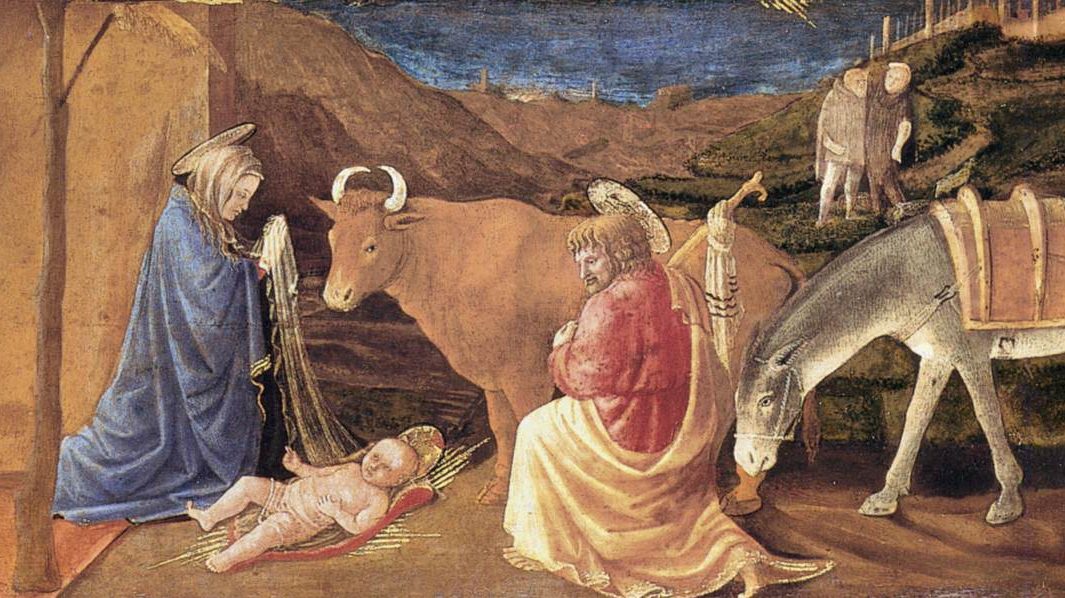The Word Made Flesh
The Nativity of the Lord (Christmas)
- Lectionary Readings from the USCCB
- (Note that there are different readings for the Vigil Mass, Mass during the Night, Mass at Dawn, and Mass during the Day.)

Christmas is the second greatest feast of the Church’s calendar, the greatest being Easter when we celebrate the Resurrection of Jesus Christ from the dead. But to truly grasp the significance of that Paschal mystery, we must roll back the calendar to December 25. And to truly grasp the significance of what we celebrate on December 25, we must roll the clock back even further to the utter beginning. “In the beginning was the Word…” (Jn 1:1).
The opening of John’s gospel, which is read at Mass on Christmas Day, echoes the opening of the book of Genesis: “In the beginning, God…” (Gen 1:1). Before the dawn of time, before the Big Bang bung, before anything else existed at all, all that existed was God. God is the only eternal being. But God the Father was not alone. John makes that clear when he says, “In the beginning was the Word,” and “the word was with God.” He explains how this can be when he says, “and the Word was God” (Jn 1:1). Jesus puts it this way: “I and the Father are one” (Jn 10:30).
Genesis tells us how God speaks creation into being. God says, “light” and there is light (Gen 1:3). But what happens when God speaks His own name? What is God’s Word for Himself? The Word of God is the perfect Image of God, his only begotten Son. Again, Jesus puts it this way: “If you have seen me, you have seen the Father” (Jn 14:9).
What John tells us in the prologue of his gospel — the absolutely astounding claim that he makes right out of the gate — is that “The Word became flesh and made his dwelling among us” (Jn 1:14). The One who made the world has entered into the world. This is less like an artist painting a picture of himself and more like an artist stepping into his painting and walking around in it. It’s like when Alfred Hitchcock or M. Night Shyamalan cast themselves as characters in their own films, only instead of a minor character, God plays the lead role, and instead of a movie it’s history.
If you travel to Bethlehem today, you can still see the field where the angel appeared to the shepherds announcing, “Glory to God in the highest and on earth peace to people of good will” (Lk 2:14). Shepherds still watch their flock by night there. You can go into the church built over the cave where the Nativity took place and descend down the steep steps into that cave and place your hand over a silver star that marks the very spot where Jesus Christ was born. You can touch it.
If you travel to Nazareth, the town of Mary where the Annunciation took place and where the Son of God was conceived in her womb by the power of the Holy Spirit, you can step into the church built over that spot and see words inscribed upon the altar: Verbum Caro Hic Factum Est. Those are the words of John’s gospel in Latin, “The Word became flesh,” to which has been added the Latin word hic, meaning “here.”

The Word became flesh here. This is not a fairy tale. This is not an allegory. This is not a pious legend. This is history. This really happened, which means it must have happened somewhere, and that somewhere is Nazareth, where he was conceived; and Bethlehem, where he was born; and Jerusalem, where he was crucified and buried and rose from the dead. You can read about it in the gospel. You can also get on an airplane and go there. This is real.
The Word of God was born of the Virgin Mary and became man. We bow when we say those words of the creed during Mass, and on Christmas Day we genuflect. God has made himself a part of his own creation. He is Emmanuel, which means “God with us.” The divine Author has written himself into the story. He is Jesus, which means “God saves.” True God and true man, he is the hero of the story we are all living in.
It’s an exciting story, with all the elements you could want for a grand adventure. There is a hero and a villain, conflict and resolution. And it has surprising twists, like the King of the Universe being born in a manger in a backwater town in Judea. Ultimately it’s a love story. And the best thing about it is that it’s a true story, one that’s still being written, with you and I a part of it.
Like all love stories it has its moments of heartbreak. When the Word of God came into the world, John tells us “the world did not know him. He came to what was his own, but his own people did not accept him” (Jn 1:10-11). But even knowing that many would reject him, he came anyway, to be the “true light which enlightens everyone” (Jn 1:9).
Jesus came to reveal God to us (Jn 1:18), so that we might know that God is Love (1 Jn 4:8). The Son of God became a Son of Man so that we might become children of God, his brothers (Jn 1:12). This is why his coming was announced by the angels with a proclamation of peace, and why we rejoice on this day, regardless of whatever darkness might be casting its shadow on the world at the moment. This is the good news of Christmas: “The light shines in the darkness, and the darkness has not overcome it” (Jn 1:5).

